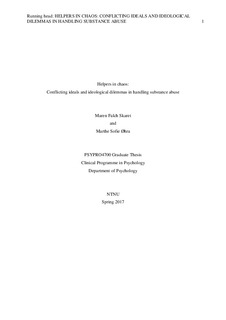| dc.description.abstract | The way substance abuse problems have been handled, have changed significantly over the last century. Historically, abuse of psychoactive substances has been regarded as immoral behaviour, and the use of some of these substances is still illegal by Norwegian legislation. At the same time substance abuse is an issue of health, and people with substance abuse problems received status as patients in 2004. These diverging views have made moral dilemmas common in the practice of help-giving, and may lead to ambiguity regarding both what goals to obtain in the helping and the chosen approaches. We investigated how helpers’ talk was used to make sense of their practice. Both semi structured in-depth interviews and focus groups were carried out. The theoretical positions guiding our work were social constructionism and discursive psychology, and we analysed our material with tools from positioning theory. We were able to differentiate three different discourses helpers drew upon, namely the ‘good’ helper, caregiving and healthcare. These discourses were simultaneously overlapping and conflicting, and represented ideals of helping. They were drawn upon when helpers accounted for their practice. Some created ideological dilemmas, and those of ‘abstinence’ and ‘coercion’ were found to be highly relevant in our helpers’ work. In meeting these dilemmas, our helpers expanded the discourses with linguistic strategies as they shifted subject positions during conversations of different topics. Our findings suggest that a discursive approach may generate new knowledge of practices and ideals for helpers working with substance abuse problems. This knowledge may make possible more pragmatic ways of helping. Based on our findings, we suggest that a focus on cultural awareness of a familial approach of belonging should be further explored, as it seems especially fruitful in the work of helping people with substance abuse problems. | nb_NO |
